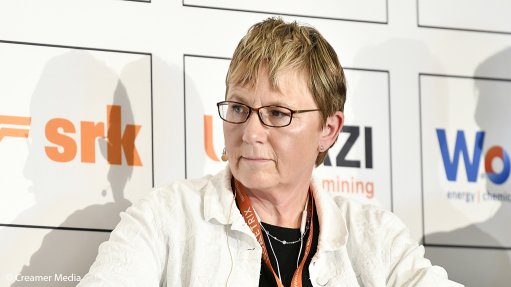
Accenture senior MD Rachael Bartels
Photo by: Creamer Media's Dylan Slater
JOHANNESBURG (miningweekly.com) – With economies seeking to tap into the $4.5-trillion opportunity that the circular economy presents, mining companies are under pressure to adapt faster and embrace change in order to remain relevant, Accenture senior MD Rachael Bartels said last week.
Speaking to Mining Weekly Online on the sidelines of the Joburg Indaba, she explained that, by taking the right steps, mining and metals companies could reposition themselves to create a sustainable source of new revenue streams through the economy.
This is particularly important, she added, considering that shifting downstream demand was creating a risk as more innovative players were capitalising on emerging opportunities to monetise the circular economy.
The circular economy continually uses and re-uses many of the same resources to minimise environmental impacts and was attracting more and more attention as companies started to see the benefits from effective recovery, Bartels said.
However, she lamented that mining and metals companies were not always well positioned to monetise the flow of recycled metals, considering that the industry usually focused on operational efficiency, such as recycling water or monetising waste streams, such as slag or used tyres.
“The trick is how to actually do that at scale, and tie it to your purpose,” Bartels elaborated.
With demand slowing in some sectors, the transition to a low-carbon economy is creating increased demand for base and precious metals, silver, nickel, lead and zinc, Accenture has found.
In this respect, both Accenture and Bartels advise stakeholders to determine where best to focus in a shifting marketplace, and how best to take advantage of both the circular economy and clean technology trends.
Referring to a study done by Accenture, she noted that consumers had changed their buying behaviour based on sustainable products.
“The reality is that a significant proportion of people, well over half [of respondents in the study], have changed their buying behaviour based on their perception of the brand that they’re buying and the sustainability of either the brand or the products that they’re buying,” she pointed out.
This speaks to the drive towards the circular economy growing globally, with Accenture, during the United Nations Sustainability Summit, completing another CEO review, which sought to find out what CEOs’ thoughts were on sustainability.
“The CEOs that we canvassed were saying that [sustainability] is becoming increasingly important, [that] they’re not doing enough and are increasing the number of things that they are actually doing,” Bartels notes.
She adds that she is “seeing a massive push” towards the circular economy, part of which is coming from the consumer and part of it is coming from the first tier of companies that are interacting with the consumers.
“I’m also seeing it as a whole recognition that being more circular makes good business sense,” she pointed out.